Diversity
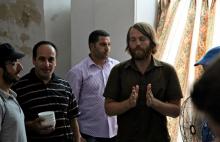
Hebron is known as one of the most volatile cities in the whole region of Israel/Palestine. Located in the heart of the West Bank, both Jews and Arabs have had roots here for thousands of years. Having endured years of conflict, racism, violence and separation, Hebron’s inhabitants have been covered in a narrative lacking an acknowledgment of a shared humanity.
It’s in the middle of such realities that our Learning Community (part of our organization, The Global Immersion Project) feels called to listen, learn, and be radically present. Through the art of friendship making, shared tables and storytelling, we desire to promote the just heart of God by being a people of reconciliation in the way of Jesus.
It was this posture that landed us in the underground home of a local Muslim Palestinian family who is close friends with the Jewish Rabbi who was hosting us in the old city of Hebron (he is both a host and dear friend). Having prepared a beautiful and expansive Palestinian meal, they warmly invited each one of us into their home and said, “Today, this is your home.”

My sons, ages 13 and 10, spend two evenings each week on a golf course because I parent out of my own personal brokenness, which includes an acute awareness of life experiences and skills I was not exposed to growing up.
Tennis lessons. Skiing lessons. Swimming lessons. Golf lessons.
Check. Check. Check. Check.
(My daughter got the first three. She escaped golf because she has immersed herself into the world of dance for the past few years though it’s not completely out of the picture yet.)
One of my goals has been to expose my children to things I didn’t do and at one point or another felt like I had missed out on. This all despite the fact that I also wrestle with my own personal prejudices against sports like tennis and golf because they have in one way or another represented privilege and access to opportunities and networks my parents and I did not have.
So it did not surprise me to see a very diverse group of participants on our first day at the course – diverse meaning White or Caucasian children were in the minority. Golf, whether you are in business or in medicine, more if you are male but increasingly so if you are female, is one of those “life skills” that also translates into opportunities and networks that non-White communities continue to learn about and enter into.
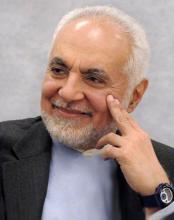
Imam Feisal Abdul Rauf has spent most of his adult life trying to build interfaith and international bridges. But to many Americans, he is the public face of the so-called "Ground Zero mosque," one of the most controversial religious projects in recent U.S. history.
Rauf reflects on that turmoil in his new book, Moving the Mountain: Beyond Ground Zero to a New Vision of Islam in America. But as the book's subtitle suggests, the longtime imam spends most of his time facing forward — toward the development of a distinctly American brand of Islam. He spoke recently with Religion News Service. This interview has been edited for length and clarity.
Q: Why did you write this book?
A: I wrote this book because the American public saw me and heard me, but really didn’t get to know me very well, or to understand what my work was all about. This book is my calling card to the American public.
Recently the owners of a large tract of land in South Dakota began looking to sell their property. The problem is that the land that they own is Pe’ Sla, land sacred to the Lakota Native American people. Currently the Lakota are organizing efforts to raise money to buy back their sacred land in hopes of preserving access to it and to prevent the building of a highway the state has planned.
This situation would be top news if it were any other religious site were involved, but this has barely made it into mainstream media.
Editor's Note: The family involved in auctioning off the land canceled the auction. According to the Rapid City Journal, the fund raisers hoping to purchase back the land are unaware what the move means for them.
"It could be good and it could be bad," said Rodney Bordeaux, president of the Rosebud Sioux Tribe. "We just don't know what the family wants. That's kind of the unknown. We'll just have to wait and see."

I was watching this recent video where Tim Keller (along with Don Carson and John Piper) addresses why The Gospel Coalition is explicitly complementarian (a nice way to say that they don't believe in gender equality). Why do they see this as something that a group that is supposed to be focused on the Gospel would need to stress?
Keller begins by saying that he does not think the issue of gender roles are directly part of the Gospel, and acknowledges that bringing it up in the context of answering a person's questions of what it would mean to be a Christian could "certainly muddy the waters."
So why the focus then? He says it has to do with how we read Scripture.
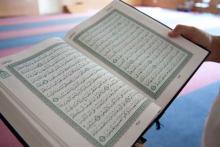
This year during Ramadan — the ninth month of the Islamic lunar calendar when Muslims believe the Quran was first revealed to the Prophet Muhammad — I was in solidarity with my Muslim sisters and brothers throughout the world by reading the Quran. But here's the thing: I am a Roman Catholic.
My copy of the Quran, with more than 1,700 pages, has sat on the top shelf of my bedroom bookcase among other sacred texts for 14 years. Typically I would use it as a sporadic reference and resource to better understanding Islam, reading a few short passages at a time.
However, this Ramadan something at the core of my being was calling me to read the Quran in its entirety. And so my monthlong Ramadan journey began.
Each day and evening, the prayerful poetry in the Quran held me in a meditative mode of peace as I read without being aware of the passage of time.
When I finished reading a week before the end of the month, I felt as if the Quran was almost endless, reaching beyond the confines of my calendar days. I didn’t want to read the last page. I didn’t want to be finished.
The Quran inspired me, taught me and helped me to remember my essential holiness and how that holiness in the image of God should be reflected in the world.

It was the summer of 1994 and about 10 friends and I sat huddled around Bibles in my friend’s living room. It was a “scripture party.” The lights were dim and the air was full of anticipation and mystery. We did not know what God might reveal as we opened the book of Revelation and read it out loud, in community, in one night.
This bears resemblance to the way the early church would have read the scripture. They were an oral culture, not a written one. The Hebrew Bible was written on scrolls that were read aloud to congregations. Most of the New Testament was written as letters to the worshiping bodies of whole cities (i.e. the saints in Ephesus, the church in Philippi, the body in Corinth, etc.). When received, the letters would be read out loud to the whole church community and received as God’s instruction revealed through the apostles for the edification of their communities.
Imagine being one of the very first followers of the Jesus “Way” (Acts 9:2).
Imagine being a persecuted religious group. You have to use code — the sign of the ichthys — to identify yourself to other believers for fear of religious persecution. Only when you are gathered together in secret can you speak openly about your faith. Only then can you be fully known and appreciated for the whole image of God that lives inside of you.
Imagine huddling in a secret meeting place and reading the Apostle John’s Revelation of Jesus Christ for your nascent faith community in Ephesus or Smyrna, or Pergamum, or Thyatira, or Sardis, or Philadelphia, or Laodicea (Revelation 2-3). Imagine living in Ephesus and reading Paul’s prayer for your church to understand its hope and inheritance (Ephesians 1:17-2:22).
And imagine being rich in the early church and hearing James’ letter warning: “Listen! The wages of the laborers who mowed your field, which you kept back by fraud, cry out, and the cries of the harvesters have reached the ears of the Lord of hosts.”
Imagine hearing it all for the first time. It all feels so real. The call to holiness feels so urgent because God feels so present.
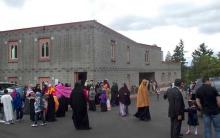
Nearly all Muslims can agree on the basic beliefs of Islam: There is one God, Muhammad is God’s prophet, Muslims should fast during the holy month of Ramadan, and give alms to the poor.
Yet beyond these central pillars of the faith, Muslims worldwide vastly differ as religious convictions are shaped by cultural and social contexts, according to a new report by the Pew Forum on Religion & Public Life.
“The World’s Muslims: Unity and Diversity” draws on 38,000 face-to-face interviews in 39 countries, and finds that Muslims differ sharply over questions of faith like who counts as a Muslim and what spiritual practices are acceptable.
With 1.6 billion adherents, Islam is the world’s second-largest religion, behind Christianity, and accounts for one-quarter of the world’s population.
A group of faith leaders Thursday exhorted Americans to do more than pray for better times.
Representing seven different faith traditions, many advocated a period of public mourning after a week that saw a shooting rampage at a Sikh temple and a suspicious fire at a Missouri mosque.
"It is my hope that this is more than a time to express personal sorrows," said Presiding Bishop Mark S. Hanson of the Evangelical Lutheran Church in America.
"Our most concrete rejection of violence occurs when we engage the neighbor, the neighbor who is new in our community, the neighbor who worships differently than we," he said.
Four hundred people gathered across from the White House last night with a single message: “We are all Oak Creek.”
Responding to the murder of six Sikh worshippers, the wounding of four others, including police officer Lt. Brian Murphy, and the suicide of perpetrator Wade M. Page, hundreds gathered to stand with the Sikh community as they invited prayers for the victims, the murderer, and his family. "Tonight, we are not Jain, Muslim, Hindu,” announced one speaker, “we are all Sikh tonight. We are all Oak Creek. We will not allow fear to overcome us."
In a response reminiscent of the Amish during the Nickel Mines, Pa., massacre in 2006, the Sikh community, the fifth largest religion in the world, is not used to the national spotlight in the U.S. But neither do they shy away from an opportunity to introduce their faith to a wider audience and to practice what they preach.
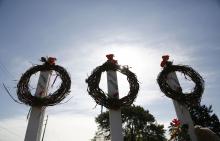
Few can know what goes through the twisted mind of a mass killer, but Wade Michael Page left behind plenty of signs that he was consumed by one thing: hate.
Page, 40, was identified by police Monday as the gunman who killed six worshippers Sunday morning at a Sikh temple here. Local and federal authorities said they were investigating whether the shooting was an act of domestic terrorism.
The bald, heavy man decorated in tattoos and shot dead in an exchange with police played in hate bands and used hate-filled heavy-metal music to recruit white supremacists to the cause.
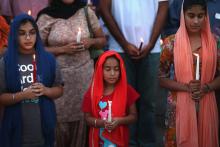
First, there were the cryptic news bulletins on TV. There had been a shooting at a Sikh temple in a Milwaukee suburb called Oak Creek. Then the details began to emerge. Six people were dead, others critically wounded, including a police officer. The shooter, who had a long history with the white power movement, was shot dead by another police officer, bringing the toll to seven.
And all around Wisconsin, people watched in horror as we learned of yet another mass murder, this one in our backyard, this one shattering the tranquility of a Sunday morning worship service.
There are not a lot of Sikhs in Wisconsin – about 3,000 in the southeastern part of the state, perhaps 250 or so in the Madison area where I live. Yet people everywhere shared the horror and the sadness of that moment.
In the Milwaukee area, a group called the Light Brigade — which had held up illuminated letters with political slogans during the effort to recall Gov. Scott Walker earlier this year — stood in Cathedral Square with a simple, powerful message in lights: “Wisconsin Weeps.”

Ralph Singh, director of publications and public relations for Gobind Sadan — "God's House Without Walls," a spiritual community rooted in the Sikh tradition with locations in India and the United States — responds to the mass shooting at a Wisconsin Sikh gurudwara that has devastated the faith community.
Sikhism was founded more than 500 years ago in India. Observant Sikhs do not cut their hair, and male followers of the religion wear turbans, which they consider sacred.
"A Sikh, wherever they go in the world, is committed to building community a community of peace, an inclusive community to stand as an affirmation of what we now call pluralism," Singh says.
Listen to what Singh as to say on a video inside the blog ...
A Joplin, Mo., mosque has again been the target of a "suspicious" fire, according to the Joplin Globe. The Islamic Society of Joplin reported on Monday the second fire  this summer — this one engulfing the entire building.
this summer — this one engulfing the entire building.
The mosque's Imam said the blaze will not keep worshippers from their prayers. From the reports:
“This should not stop us from serving God,” said Imam Lahmuddin, the mosque’s religious leader. “We still have to fulfill our obligation. We will do our prayer in other places. If we don’t find a place, we will do our prayers in our home. We cannot miss any of the five prayers.”

Dozens of Muslim women are competing at the 2012 Summer Olympics in London — several of them as the very first female athletes chosen (and allowed) to represent their countries in the Olympic games.
These women are vanguards, shattering stereotypes, subverting cultural-religious mores, and creating a legacy that will benefit female Olympians of all creeds for years to come.
As has been widely reported and celebrated (in many quarters), Saudi Arabia sent two women athletes to represent the Arabic nation for the first time at the Olympic games — 16-year-old judoka (judo competitor) Wodjan Ali Seraj Abdulrahim Shahrkhani and 800-meter runner Sarah Attar, 19.
Attar, who is a California-born American but holds dual-citizenship in the Arabian kingdom because her father is Saudi, trains in San Diego, not far from Pepperdine University where she is a junior art major and also runs on the university's track team.
Shahrkhani, whose father is a judo coach and an international referee in the sport, won a dispute with Olympics officials earlier this week to be allowed to compete while wearing her hijab or traditional head covering worn by many observant Muslim women.
Saudi Arabia is not the only majority Muslim country sending its first women competitors to the Olympics. Brunei and Qatar also followed suit, sending five female athletes in total. Runner Maziah Mahusin is the lone woman on Brunei's three-person Olympic team. Qatar's four women Olympians are swimmer Nada Mohammed WS Arakji, sprinter Noor Hussain Al-Malki, table tennis player Aia Mohamed, and air rifle competitor Bahia Al-Hamad.
Both Mahusin and Al-Hamad were chosen as flag bearers for their nations at the opening ceremonies in London last week. Twelve majority Muslim countries — Tajikistan, Qatar, Morocco, Indonesia, Turkey, Jordan, Iraq, Djibouti, Comoros, Brunei, Bahrain, and Albania — chose women as flag bearers at the opening ceremonies that were viewed by an estimated 1 billion people worldwide.
IN MAY 2011, I found myself in France, sitting with brothers of the Taizé ecumenical monastic community, talking about the history of my people, the Lakota.
After evening prayer, the prior, Brother Alois, invited a few of us to join him for supper. This special gathering was held in the bedroom of Brother Roger, founder and first prior of the Taizé community. His room has been kept the way he left it when he died in 2005. The room held a small shelf filled with books, a few furnishings, and a table by the large window. The walls were painted a mango orange color that seemed to enhance the already spirit-filled space. The light in the room became warmer and softer as the sun set.
While eating we talked about many things related to the Lakota, in particular, and First Nations peoples in general. The brothers’ questions were heartfelt, and they listened intently to my every word. At some point during the conversation, I came to a new understanding. This time of breaking bread and conversation was a sacred time. It was Eucharist.
I was born and raised in South Dakota where my people, the Oglala Lakota, reside on the remnants of our original homeland that make up the Pine Ridge Reservation in southwestern South Dakota. One of my earliest memories is hearing the drum and singing late into the night and feeling the earth reverberate from the deep bass of the drum as both sound and feeling lulled my siblings and me to sleep.
Like most people, I knew very little about what the Taizé community actually does, other than their music. I owned a collection of chants on CD. I’d sung a couple of chants in English during worship services over the years. It wasn’t until Brother John from Taizé came to Pine Ridge in 2010, and I was asked to be his host, that their work for reconciliation became clearer to me.

I have a love/hate relationship with the Olympics. I love the pageantry and global drama of it all. And even as one who hardly ever watches sports (I make exceptions for Roller Derby and Quidditch), I nevertheless find myself glued to the screen whenever the Olympics roll around. At the same time I am uneasy with the neo-colonial aspects of the Games and the fact that one’s ability to win a medal increasingly depends upon how much money one’s country has (making the Games a vivid illustration of global economic injustice). Yet even as I have watched (and enjoyed) the London Games with conflicted emotions, I find myself more and more uncomfortable with the ways the presentation of the Olympics serves to reinforce harmful assumptions about women in our culture.
It started before the Games. As the world geared up for the Olympics, it was hard to avoid hearing some guy or another (from TV hosts to bloggers) saying that what they were most looking forward to watching was women’s beach volleyball. It was this strange inside joke insinuating that the real purpose of the Games was to give them an opportunity to see women diving around in bikinis. I even heard complaints about the new Olympic rule allowing women to compete fully covered (a concession offered to allow Muslim women to compete in the Games). It was uncomfortable to hear how nonchalantly women continue to be reduced to mere sexual objects, but I brushed it aside as typical of our culture.
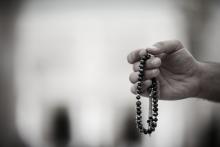
After two days of deep and unwavering pangs of hunger and thirst that had to wait for sundown to be filled, I had an epiphany: In the same way that I waited eagerly for the breaking of the Ramadan fast each night — counting it as something to celebrate — on the day Jesus comes again, we will celebrate. On that day there will be no injustice anymore. Imagine it! There will be no hunger anymore! There will be no one who is thirsty anymore! All will have their fill! All will taste the sweetness of life! All will be free of oppression! All will be able to laugh and play, and no one will be lonely any more.
Then it struck me: Ramadan offers an emphatic example of what is to come. Just as the community of creation suffers and groans waiting for all the relationships broken at the Fall to be made right again (Romans 8:18-23), so the communities that practice Ramadan suffer and grow together each day, waiting for their very bodies to be made right again each night through the intake of food and water.

I’ve been a fan of Chick-fil-A for a long time. Their food is always great, their service is impeccable (almost to the point of being a little creepy), and the restaurants are squeaky clean.
It’s not every day that you can enjoy a fast food restaurant where you actually feel like you’re putting something reasonably good for you in your body. Well, at least not as bad as some.
But the point is, I have always liked them. And if I like them, my wife, Amy is practically a Chik-fil-A disciple.
We’ve planned meals on the road around their locations. Sure, I’ve known Chik-fil-A was a Christian-based organization with some values that leaned farther right than my own, but I respected their business model and ethic. Plus, I’m used to having fellow Christians to my right.
And then I saw this video:

It is difficult to discuss "hard topics" with people with whom I disagree.
When someone supports a political candidate whom I resist, holds to a theological understanding that I find confusing, or when I hear opposing points on climate change, poverty, global economics, human sexuality, etc., it is challenging to listen with a genuinely open ear.
However, what I have found is that, even if I feel passionate about a particular point of view, when I am able to open up and genuinely listen to others, great things take place throughout the exchange. Through honest and open interaction, an increased level of mutual respect and understanding is achieved, we learn to understand why things are perceived the way they are, and the overall strength of the relationship grows.
In our current North American climate of political polarization, religious division, and socio-economic seclusion, it is time to have more dialogue on — among other things — dialogue.
A friend of mine once said, “a true and genuine dialogue only takes place when each person is willing to be ‘converted’ to the other side of the argument.” At first I was skeptical of this remark, as I wondered how I could ever open myself up to being “converted” on certain topics about which I felt strongly. But now I am beginning to see the wisdom in such a statement.